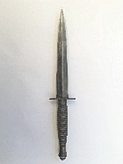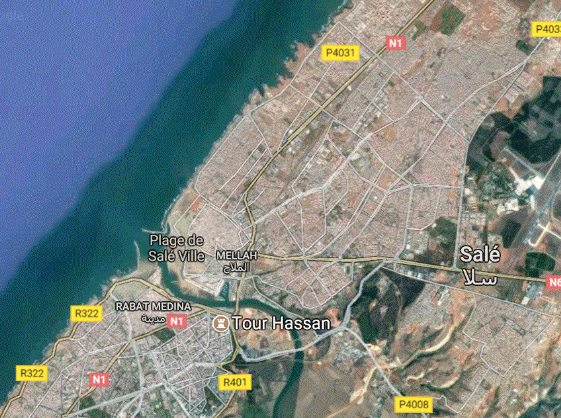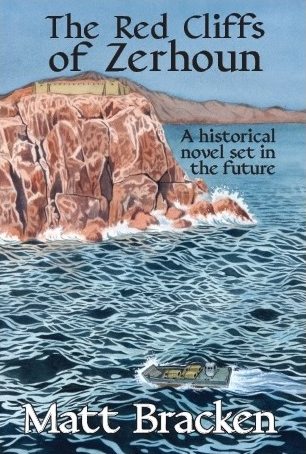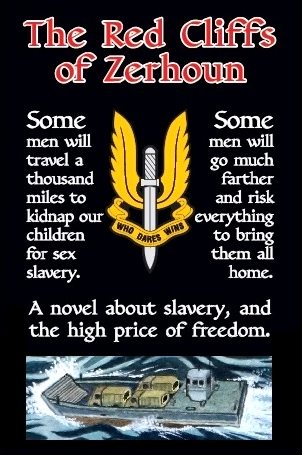Matt Bracken’s long-awaited new novel, The Red Cliffs of Zerhoun, is now available, both in a paperback edition…
…and in a Kindle version:
Dymphna bought the Kindle version as soon as it came out, and has already finished reading it. She says the action is fast-paced, the story contains surprising plot twists, and the characters are well-developed. She also appreciated the rich historical detail.
You’ll be hearing more from her about Red Cliffs in due course.
In the meantime, our English correspondent Seneca III has supplied a historical preface for Gates of Vienna readers. As it happens, he worked with Mr. Bracken as a technical consultant on the British parts of the book, so in the essay below he outlines the history of the Moorish slavers in Europe, with special emphasis on the British Isles.
The Red Cliffs of Zerhoun, by Matthew Bracken – A Commentary
by Seneca III
Part I – As it was
During the dark winter months, driven by westerly gales, the deep, grey rollers of the North Atlantic descend upon the western coastlines of Ireland and Britain with a cold, inanimate ferocity. Yet each year, without fail, the seasons progress and winter slowly segues into spring and spring into summer, and with summer comes the sailing season.
 And, for now at least, in the calm of these summers, protected by the maritime forces of the Irish Republic and Great Britain, craft of every type, large and small, make their way to and fro on business or for recreation whilst the towns and villages on the surrounding coastlines bustle with holidaymakers and visitors from far and wide, but other times have not always been so pleasant. From the 16th to 19th centuries the sailing season brought a horde of far less welcome visitors: Barbary Corsairs, the bearded, demented Slaves of Allah, who descended like a wolf on the fold to rape, plunder, kill, torture and enslave all in their path with an equally cold ferocity.
And, for now at least, in the calm of these summers, protected by the maritime forces of the Irish Republic and Great Britain, craft of every type, large and small, make their way to and fro on business or for recreation whilst the towns and villages on the surrounding coastlines bustle with holidaymakers and visitors from far and wide, but other times have not always been so pleasant. From the 16th to 19th centuries the sailing season brought a horde of far less welcome visitors: Barbary Corsairs, the bearded, demented Slaves of Allah, who descended like a wolf on the fold to rape, plunder, kill, torture and enslave all in their path with an equally cold ferocity.
They came from the shores of Tripoli and Morocco…

…paralleling the coast of an Iberian Peninsula still recovering from the physical and psychological traumas of the seven-hundred-year Reconquista and the centuries-long depredations of the fratricidal Berber, Almohad, Almoravid and Umayyad Caliphates. Then, leaving astern the westernmost point of Europe, Carbo da Roca, they pressed on past La Coruña to steer either due north across the Bay of Biscay or to meander unopposed along the lee shore of the Atlantic seaboard of a still turbulent France, raiding and ravaging as they went, until their bows breasted the first gentle waves of the Celtic Sea.
From then onwards, sporadically, for over 300 years they ravaged far and wide into northern Europe, from the coastlines of Ireland and Britain to as far north as Scotland and Iceland and easterly as far as the Netherlands. They seized ships and raided coastal settlements, taking an estimated 800,000 to 1.25 million Europeans to the slave souks of Algiers, Tunis, Rabat and Salé. It was Corsairs from the latter who in 1627 seized and held the only part of these islands to ever fall into Muslim hands for a prolonged period (until recently, that is): the tiny outcrop of Lundy lying at the mouth of the Bristol Channel only twelve miles from mainland Britain.

For the best part of five years, until 1632 when Sir John Pennington and his men-at-arms landed, put the barbarians to the sword and tore down their Ottoman flag, Lundy was a transit point for the slavers. Throughout the season its holding pens were gradually filled, awaiting the autumnal voyage south to North Africa. There, upon the auction blocks were paraded the men, chained and beaten into submission, the women naked, shaved and fragrantly oiled and, beside them, the most prized of all that booty, the pre-pubescent virgin girls, the ones who commanded the highest prices of all.
 Thus, for close on the 200 years since the French finally put an end to Muslim piracy and slaving in and around the Mediterranean basin by taking Algiers in 1830 and, in the years that followed, all of Algeria, once again we face this old enemy. As the 21st century corsairs of ISIS so profoundly demonstrate, it is axiomatic that apart from opportunity, nothing in Islam changes.
Thus, for close on the 200 years since the French finally put an end to Muslim piracy and slaving in and around the Mediterranean basin by taking Algiers in 1830 and, in the years that followed, all of Algeria, once again we face this old enemy. As the 21st century corsairs of ISIS so profoundly demonstrate, it is axiomatic that apart from opportunity, nothing in Islam changes.
And as it has come to pass that only we have changed, and the inevitable result of this cultural spinelessness and moral turpitude that now terminally infects the West will be what leads us on from the phony war of today into a possible but not totally unfamiliar tomorrow… and perhaps even unto similar redoubts.
Seneca III
Middle America, July 23rd, 2017
Matthew Bracken was born in Baltimore, Maryland in 1957, and attended the University of Virginia, where he received a BA in Russian Studies and was commissioned as a naval officer in 1979. Later in that year he graduated from Basic Underwater Demolition/SEAL training, and in 1983 he led a Naval Special Warfare detachment to Beirut, Lebanon. Since then he’s been a welder, boat builder, charter captain, ocean sailor, essayist and novelist. He lives in Florida. Links to his short stories and essays may be found at EnemiesForeignAndDomestic.com. For his previous essays, see the Matthew Bracken Archives.



One feature of Matt Bracken’s book that particularly intrigued me was the inclusion of two main characters who are of Berber origin. The Berbers have a fascinating history – and pre-history – as this wiki indicates:
https://en.wikipedia.org/wiki/Berbers
Now I have to find a book on the Berbers. Just another look at what-might-have-been had Islam not overrun North Africa, akin to the one I got from reading Emmet Scott’s book. That one leaves the reader with a huge sense of loss for all that was lost.
You can find a fascinating vid on UTube
This just makes it sadder that all North African governments are pursuing a policy of Arabization and Islamization as the way forward.
It is also hypocritical, because these policies excuse Arab/Turk Muslim imperialism and conquest while condemning French imperialism.
Newly-Islamized Berbers played the leading role in the conquest of Spain.
Matt Bracken: The Hybrid Vigor of the Coming European Islamic State
https://gatesofvienna.net/2016/05/matt-bracken-the-hybrid-vigor-of-the-coming-european-islamic-state/
The men of the coastal settlement of Baltimore, S.W. Ireland, returned home from a very long day’s fishing, June 20th 1631, to find the village empty, all the women and children gone. In their absence muslim pirates had landed and taken them all to captivity, as galley slaves and sex slaves.
The village was abandoned after that, and left deserted for a long time.
See “Sack of Baltimore” online.
On this topic, I would encourage GoV readers to take a look at this essay (from The Iconoclast section of the New English Review) which quotes what John Quincy Adams had to say, in a very straightforward manner, about Islam:
http://www.newenglishreview.org/blog_direct_link.cfm?blog_id=66423&John%2DQuincy%2DAdams%2DOn%2DIslam%2DOld%2DMan%2DEloquent%2DPart%2DII
Thanks for a great link, keelie.
Lundy, a most interesting island, a history of truth that is stranger than fiction
https://en.wikipedia.org/wiki/Lundy
Then this guy’s life, is an astonishing history, of changes and daring ado.
This was the captain involved in the “Sack of Baltimore”.
It sort of makes wonder about the attraction the Dutch had for Barbary pirates, and now in part, their soft spot for those immigrants today.
What tangled webs we do weave? with in ourselves..
There was a short article in the Wall Street Journal some 20 years ago (when I still hung on every word they published before they became total open-borders sellouts). It told of a Dutch shipwreck in the East Indies which quickly devolved into a Lord of the Flies situation with half of the survivors managing to escape to another island. Another Dutch ship rescued them and summarily executed the savages who drove off the other civilized part of the ship.
The author’s point was that the rescuing Dutch captain was well aware of a tendency in the Dutch character toward cruelty and wasted no time on sorting out how things had transpired.
I am not making a case for this aspect of the Dutch character – and I personally experienced the Dutch in 1962 as kind and droll – but the author clearly thought there was a hard edge to their character.
Another article that I may have read on GoV described the core Dutch political system that works to maintain firm Establishment control and that in the distant past had not been above murder. That said one wonders what Establishment on the planet doesn’t operate in precisely the same way. The American leftist Establishment is demonstrating, let it be said, a dishonesty, viciousness and treachery the equal of anything known about events long ago in Sumatra. And the governments of Germany, Sweden, and Canada – in the name of compassion and justice – are proving to be quite reptilian.
As has been noted (until recently) The muslim slave trade was a horrible blight upon all of Europe. European coastlines along the Mediterranean were literally devoid of human occupation due to the slaving raids that lasted over 100 years. No where was safe, not the far north of Europe nor even Iceland.
That’s right. I first got my eyes opened when I read “White Gold: The Extraordinary Story of Thomas Pellow and North Africa’s One Million European Slaves” by Giles Milton.
Atlantic Jihad: The Untold Story of White Slavery
John Winthrop, the second governor of the Massachusetts Bay Colony, wrote of one man of means who gave up on the colony and sailed back to England. He was captured by slavers on the way home. The North Atlantic was not the only threat to those brave souls.
I’ve read all if Matt Bracken’s novels & look forward to diving into Red Cliffs. Please suggest to him to bring out a sequel a.s.a.p. His fiction is excellent & compelling, he always delivers.
This book and “White Gold” should be made compulsory reading in all European schools before it is too late-but I guess I am dreaming this will never happen in our politically so correct society.
“White Gold” is the best from my reading list at the end of the book, save “Wholly Different.”
Caliphate, Tom Kratman, 2008, (Fiction, for mature readers, free download on Amazon Kindle.)
Christian Slaves, Muslim Masters: White Slavery in the Mediterranean, the Barbary Coast and Italy, 1500–1800, Robert C. Davis, 2003.
Pirates of Barbary: Corsairs, Conquests and Captivity in the 17th-century Mediterranean, Adrian Tinniswood, 2010.
Slavery, Terrorism and Islam: the Historical Roots and Contemporary Threat, Peter Hammond, 2005.
The Stolen Village: A Thrilling Account of the 17th-century Raid on Ireland by the Barbary Pirates, Des Ekin, 2006.
Thomas Jefferson and the Tripoli Pirates, Brian Kilmeade and Don Yaeger, 2015.
White Gold: The Extraordinary Story of Thomas Pellow and Islam’s One Million White Slaves, Giles Milton, 2004.
Wholly Different: Why I Chose Biblical Values Over Islamic Values, Nonie Darwish, 2017.
(If you read only one of these books, read the last.)
Matt … congrats on another barn-burner! Great read. I have to say, though, with sorrow – I won’t be buying any more of your novels. I can’t afford the sleep-deprivation they subject me to! [Now removing tongue from cheek.]
I discovered you through Gates of Vienna, and between May 7 and May 23 last year bought everything of yours available at Amazon. The early excerpt of ‘Red Cliffs…’ on G of V really whet my appetite, and I waited (not so patiently) until July 22, when I discovered it was now complete … and you didn’t disappoint. Best yet! (More sleep deprivation!)
As to your recommended reading list above: not long ago, on another site, I saw a comment by you strongly endorsing Nonie Darwish’s book, so on your recommendation alone, I got it (though I knew of her, generally).
Though I haven’t (yet) read any of the others on your list above, I have to agree that Darwish’s book is fantastic. Contemporary, quite well written, and highly persuasive 1st-person testimony of an ex-Muslim WOMAN.
[ In our very small Latin Mass congregation we have a young (circa 28 – 32 year old Iranian Muslim convert, from whom I have learned much. I’ll be gifting him – and a number of others, politicians particularly – a copy of her book. ]
God bless, stay well … and don’t keep us waiting for too long for your next novel!
And I will, shortly, post a 5-star review at Amazon.
” Links to his short stories, essays, and the incredible novels of his eponymous trilogy may be found at EnemiesForeignAndDomestic.com. ”
/fixed by a fan of Enemies Foreign And Domestic
Really enjoyed this book and found it very easy to read and very well done as are all of Matt’s books. I buy the Trilogy by the case and have given it to dozens for friends.. I start with the first book and tell them “Read this and if you like if there are 2 more in the series” EVERY one has asked for books 2 &3 within days! I have read the Trilogy at least 4 times, only book I rate equal to John Ross “Unintended Consequences”
MB is a master story teller!
Excellent idea! I’d like to do something similar.
I’m planning on buying a 35′ bluewater sailboat in the next 3 to 5 years as a semi-retirement home where I’ll spend a goodly chunk of my time in the coming years. After reading Red Cliffs I’ve added to my list of vital components to include: a 12.7mm Ma Deuce heavy machine gun mounted forward of the mast …
I thoroughly enjoyed Red Cliffs. I even enjoyed the quiet section in the middle. The climax is vintage Bracken and covers more than 1/3 of the novel! Rockin! When you think of the real-life hard-fact Rotherham Syndrome that has spread to dozens of cities in Britain and Europe, Red Cliffs is a bracing shot of ‘Islam realism’.
This reminds me, I need to go leave a 5-star review! All the best.
I’ve just posted my review of “The Red Cliffs…” on Amazon. So I won’t repeat here except to say “MAGNIFICENT”. Another very “sleep-deprived” fan, read every one!! Equal to John Ross!!! Hurry the sequel – let’s make it “The Dan Kilmer Trilogy”! Matt, Blessings on your house 🙂
Idahojoe
Reviews are the life blood for the success of any book. You’re right about this one. It made me go get the first book in the series.